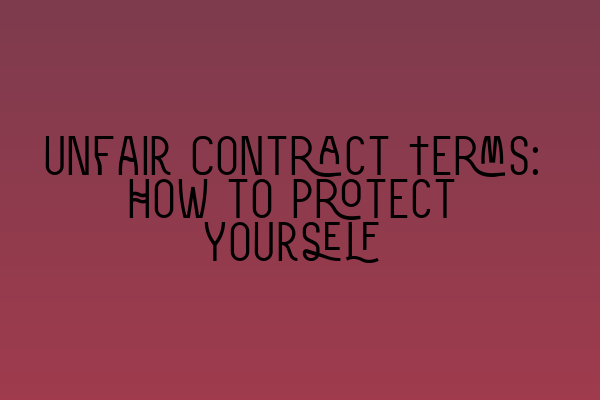Unfair Contract Terms: How to Protect Yourself
When entering into a contract, it’s important to understand that not all terms may be fair and favourable to you as the consumer or party with less bargaining power. Unfair contract terms can leave you at a disadvantage, but there are ways to protect yourself. In this article, we will explore what unfair contract terms are and provide tips on how to safeguard your interests.
What are Unfair Contract Terms?
Unfair contract terms refer to provisions within a contract that create an imbalance of power between the parties involved. These terms are typically heavily skewed in favor of the stronger party, leaving the weaker party with few options or rights. Such terms can be challenging to spot, as they may be buried within the fine print of a contract.
Common examples of unfair contract terms include:
1. Excessive Liability Exclusions: Some contracts may attempt to limit or exclude liability for damages or losses caused by the stronger party. Such exclusions can leave you vulnerable in case of negligence or breach of contract.
2. Unreasonable Penalty Clauses: Contracts occasionally feature penalty clauses that impose exorbitant charges for a breach of contract. These charges may be disproportionate to the actual loss suffered by the stronger party, putting you in an unjust position.
3. Unilateral Termination Clauses: Certain contracts empower one party to terminate the agreement without just cause or notice. This can leave you without recourse if the stronger party decides to end the contract abruptly.
4. Unfair Payment Terms: Contracts that require upfront payment in full or provide little flexibility in payment options can be burdensome. This can be especially oppressive if the goods or services provided do not meet your expectations.
Protecting Yourself from Unfair Contract Terms
1. Read and Understand the Terms: The first step in protecting yourself from unfair contract terms is to thoroughly read and comprehend the entire agreement. Pay attention to any clauses that appear unfair or disadvantageous.
2. Seek Legal Advice: If you are unsure about any terms or feel that the contract may contain unfair provisions, consult with a solicitor who specializes in contract law. They can help you identify any potential issues and provide guidance on how to proceed.
3. Negotiate or Amend Terms: Don’t be afraid to negotiate or propose changes to the contract terms. Remember, a contract is a mutually agreed-upon agreement, and it’s possible to revise terms that you find unfair. A solicitor can assist you in negotiating better terms that align with your interests.
4. Consider Alternative Options: If a contract contains excessively unfair terms and the other party is unwilling to amend them, it may be wise to explore alternative options. It’s essential to remember that you have choices and can opt-out of entering into an unfair contract.
5. Seek Regulatory Protections: In some cases, laws and regulations exist to protect consumers from unfair contract terms. Familiarize yourself with your rights and the governing laws specific to your jurisdiction. This knowledge will empower you to challenge unfair terms and seek legal remedies if necessary.
Conclusion
When entering into a contract, understanding your rights and protecting yourself from unfair terms is paramount. By reading and understanding the terms, seeking legal advice, negotiating, considering alternatives, and relying on regulatory protections, you can safeguard your interests. Remember, it’s essential to be vigilant and proactive when it comes to protecting yourself from unfair contract terms.
If you are preparing for the SQE 1 exam, we recommend checking out our related articles on SQE 1 Practice Exam Questions and SQE 1 Practice Mocks FLK1 FLK2. For comprehensive preparation courses for both SQE 1 and SQE 2, be sure to explore our SQE 1 Preparation Courses and SQE 2 Preparation Courses. Lastly, if you’re looking for important information regarding SRA SQE Exam Dates, visit the provided link for more details.
Stay informed and protected, and don’t let unfair contract terms catch you off guard!
